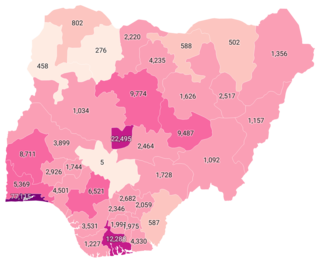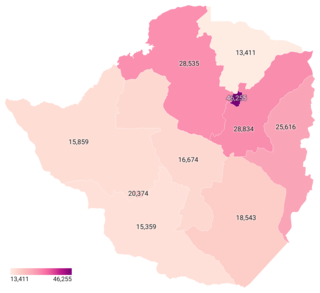
Severe acute respiratory syndrome (SARS) is a viral respiratory disease of zoonotic origin caused by severe acute respiratory syndrome coronavirus, the first identified strain of the SARS coronavirus species severe acute respiratory syndrome–related coronavirus (SARSr-CoV). The first known cases occurred in November 2002, and the syndrome caused the 2002–2004 SARS outbreak. In the 2010s, Chinese scientists traced the virus through the intermediary of Asian palm civets to cave-dwelling horseshoe bats in Xiyang Yi Ethnic Township, Yunnan.
Globalization, the flow of information, goods, capital, and people across political and geographic boundaries, allows infectious diseases to rapidly spread around the world, while also allowing the alleviation of factors such as hunger and poverty, which are key determinants of global health. The spread of diseases across wide geographic scales has increased through history. Early diseases that spread from Asia to Europe were bubonic plague, influenza of various types, and similar infectious diseases.

The COVID-19 pandemic, also known as the coronavirus pandemic, is an ongoing global pandemic of coronavirus disease 2019 (COVID-19) caused by severe acute respiratory syndrome coronavirus 2 (SARS-CoV-2). The novel virus was first identified from an outbreak in Wuhan, China, in December 2019. Attempts to contain it there failed, allowing the virus to spread to other areas of China and later worldwide. The World Health Organization (WHO) declared the outbreak a public health emergency of international concern on 30 January 2020 and a pandemic on 11 March 2020. As of 29 September 2022, the pandemic had caused more than 616 million cases and 6.54 million confirmed deaths, making it one of the deadliest in history.

Coronavirus disease 2019 (COVID-19) is a contagious disease caused by a virus, the severe acute respiratory syndrome coronavirus 2 (SARS-CoV-2). The first known case was identified in Wuhan, China, in December 2019. The disease quickly spread worldwide, resulting in the COVID-19 pandemic.

The COVID-19 pandemic in the United States is a part of the worldwide pandemic of coronavirus disease 2019 (COVID-19) caused by severe acute respiratory syndrome coronavirus 2 (SARS-CoV-2). In the United States, it has resulted in 96,249,166 confirmed cases with 1,058,506 all-time deaths, the most of any country, and the nineteenth-highest per capita worldwide. The COVID-19 pandemic ranks first on the list of disasters in the United States by death toll; it was the third-leading cause of death in the U.S. in 2020, behind heart disease and cancer. From 2019 to 2020, U.S. life expectancy dropped by 3 years for Hispanic and Latino Americans, 2.9 years for African Americans, and 1.2 years for white Americans. These effects have persisted as U.S. deaths due to COVID-19 in 2021 exceeded those in 2020.
The COVID-19 pandemic in Bahrain is part of the worldwide pandemic of coronavirus disease 2019 caused by severe acute respiratory syndrome coronavirus 2. The virus was confirmed to have reached Bahrain on 21 February 2020.

The COVID-19 pandemic in Egypt is part of the worldwide pandemic of coronavirus disease 2019 caused by severe acute respiratory syndrome coronavirus 2. The virus was confirmed to have reached Egypt on 14 February 2020.

The COVID-19 pandemic in Brunei is part of the worldwide pandemic of coronavirus disease 2019 caused by severe acute respiratory syndrome coronavirus 2. The virus spread to Brunei on 9 March 2020, when its first case was confirmed in Tutong. Many early cases were linked to Jamek Mosque Sri Petaling in Kuala Lumpur, which held a large Tablighi Jamaat ijtema event at the end of February 2020. Of Brunei's first 50 cases, 45 were related to Jamek Mosque. The pandemic had spread to all districts of Brunei.

The COVID-19 pandemic in Nigeria is part of the worldwide pandemic of coronavirus disease 2019 caused by severe acute respiratory syndrome coronavirus 2. The first confirmed case in Nigeria was announced on 27 February 2020, when an Italian national in Lagos tested positive for the virus. On 9 March 2020, a second case of the virus was reported in Ewekoro, Ogun State, a Nigerian citizen who came into contact with the Italian national.

The COVID-19 pandemic in Ivory Coast is part of the worldwide pandemic of coronavirus disease 2019 caused by severe acute respiratory syndrome coronavirus 2. The virus was confirmed to have reached Ivory Coast in March 2020.

The COVID-19 pandemic in Ghana is part of the worldwide pandemic of coronavirus disease 2019 caused by severe acute respiratory syndrome coronavirus 2. The first two cases in Ghana were confirmed on 12 March 2020, when two infected people came to Ghana, one from Norway and the other from Turkey.
The COVID-19 pandemic was confirmed to have reached Somalia on 16 March 2020 when the first case was confirmed in Mogadishu. The Somali Prime Minister, Hassan Ali Khaire announced that the government has set aside five million dollars to deal with the disease. The Somali Medical Association is concerned that the death toll in the country will be huge and that Somalia will not be able to recover from the economic effects due to poor working relations between central government and federal states which leads to lack of control by central government, as well and the lack of healthcare infrastructure. It has also been speculated that President Mohamed Abdullahi Mohamed may use the pandemic as an excuse to postpone elections. There have also been concerns over freedom of the press following arrests and intimidation of journalists who have been covering the pandemic in Somalia.

The COVID-19 pandemic in Benin is part of the ongoing worldwide pandemic of coronavirus disease 2019 caused by severe acute respiratory syndrome coronavirus 2. The virus was confirmed to have reached Benin in March 2020.

The COVID-19 pandemic in Zimbabwe is part of the worldwide pandemic of coronavirus disease 2019 caused by severe acute respiratory syndrome coronavirus 2 .The COVID-19 pandemic was confirmed to have reached Zimbabwe in March 2020. Some of Zimbabwe's provinces, especially Manicaland, Masvingo and Mashonaland East, also struggled with a malaria outbreak at the same time. Though malaria is treatable, the healthcare system faces drug shortages and increased strain with the spread of COVID-19.

COVID-19 drug development is the research process to develop preventative therapeutic prescription drugs that would alleviate the severity of coronavirus disease 2019 (COVID-19). From early 2020 through 2021, several hundred drug companies, biotechnology firms, university research groups, and health organizations were developing therapeutic candidates for COVID-19 disease in various stages of preclinical or clinical research, with 419 potential COVID-19 drugs in clinical trials, as of April 2021.

The Solidarity trial for treatments is a multinational Phase III-IV clinical trial organized by the World Health Organization (WHO) and partners to compare four untested treatments for hospitalized people with severe COVID-19 illness. The trial was announced 18 March 2020, and as of 6 August 2021, 12,000 patients in 30 countries had been recruited to participate in the trial.
Allison Joan McGeer is a Canadian infectious disease specialist in the Sinai Health System, and a professor in the Department of Laboratory Medicine and Pathobiology at the University of Toronto. She also appointed at the Dalla Lana School of Public Health and a Senior Clinician Scientist at the Lunenfeld-Tanenbaum Research Institute, and is a partner of the National Collaborating Centre for Infectious Diseases. McGeer has led investigations into the severe acute respiratory syndrome outbreak in Toronto and worked alongside Donald Low. During the COVID-19 pandemic, McGeer has studied how SARS-CoV-2 survives in the air and has served on several provincial committees advising aspects of the Government of Ontario's pandemic response.
Sotiris Tsiodras is a Greek internal medicine physician, specializing in infectiology, in charge of Greece's management of the coronavirus SARS-CoV-2 crisis.
Prior to April 2022, there were no specific, effective treatments or cures for coronavirus disease 2019 (COVID-19), the disease caused by the severe acute respiratory syndrome coronavirus 2 (SARS-CoV-2) virus. Although several medications have been approved in different countries as of April 2022, not all countries have these medications. Patients with mild to moderate symptoms who are in the risk groups can take nirmatrelvir/ritonavir or remdesivir, either of which reduces the risk of serious illness or hospitalization. In the US, the Biden Administration COVID-19 action plan includes the Test to Treat initiative, where people can go to a pharmacy, take a COVID test, and immediately receive free Paxlovid if they test positive.

COVID-19 hospital is a general name given to clinical institutions that provide medical treatment to Coronavirus Disease 2019 (COVID-19) infected patients. According to the World Health Organisation (WHO)'s COVID-19 regulations, it is critical to distribute COVID-19 patients to different medical institutions based on their severity of symptoms and the medical resource availability in different geographical regions. It is recommended by the WHO to distribute patients with the most severe symptoms to the most equipped, COVID-19 focused hospitals, then patients with less severe symptoms to local institutions and lastly, patients with light symptoms to temporary COVID-19 establishments for appropriate isolation and monitoring of disease progression. Countries, like China, Germany, Russia, the United Kingdom and the United States have established their distinctive COVID-19 clinical set-ups based on the general WHO guidelines. Future pandemic protocols have also been adapted based on handling COVID-19 on a national and global scale.













